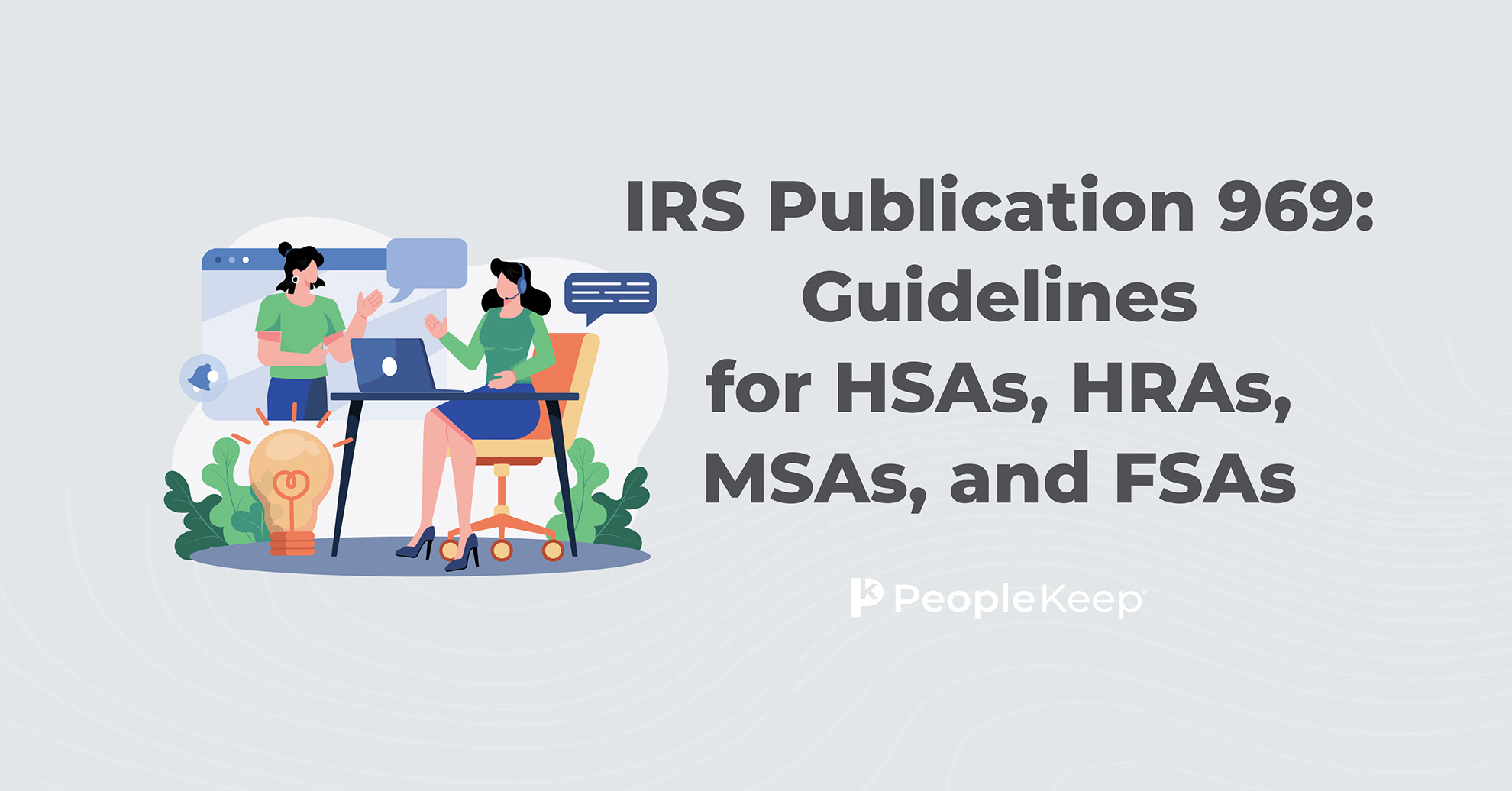2025 HSA contribution limits
By Chase Charaba on September 19, 2024 at 8:00 AM
Healthcare is expensive. But, many Americans don't have emergency savings for unexpected medical bills. According to a Bankrate report1, 27% of adults have no emergency savings. Additionally, only 29% have enough to cover three months' expenses.
Those looking for ways to save money on future healthcare expenses can set up a health savings account (HSA). An HSA is a tax-advantaged savings account. An individual or family can use an HSA to pay for their qualified medical expenses.
To use an HSA, you must pair it with a qualifying high deductible health plan (HDHP). Eligible expenses include medical, prescription, dental, or vision care services that your health plan doesn't cover. The IRS adjusts the annual HSA max contribution limit, annual deductible amounts, and other limits for HSAs each year.
In this blog post, we'll go over the 2026 HSA contribution limits. We'll also explore HSA-qualified HDHPs and IRS-determined eligibility requirements.
In this blog post, you'll learn the following:
- The updated max HSA contribution limits in 2026
- Who is eligible to open an HSA
- How the new 2026 HSA limits compare to previous years
What are the HSA contribution limits for 2026?
Investing in your HSA makes handling the expected and unexpected medical expenses that life throws your way easier. For that reason, many people choose to contribute as much as possible to their HSAs. But if you go over the annual maximum limit, the IRS could penalize you for any excess contributions.
The IRS released the 2026 HSA guidelines in Revenue Procedure 2025-192. You can always find the current HSA limits in IRS Publication 969.
Here are the 2026 contribution limits:
|
Self-only |
Family |
|
|
2026 HSA contribution limit (company + employee) |
$4,400 |
$8,750 |
|
2026 HSA catch-up contributions (age 55+) |
$1,000 |
$1,000 |
Your voluntary contributions to your HSA are generally tax-deductible. They may be pre-tax if your employer takes the money out as a payroll deduction. Any unused amounts in your HSA roll over from year to year. Rollover contributions don't reduce your overall contribution limit for the year.
How HSA contribution limits work
The IRS bases limits on contributions on the calendar year. This means the IRS prorates contributions by the number of months an individual is eligible to contribute to an HSA. If you're 55 or older by the end of the year, you can make an additional $1,000 catch-up contribution.
The IRS also has a special rule for married people who have coverage together under an HDHP. If you and your spouse are 55 or older, you can each make an additional contribution of $1,000.
For example, an eligible individual who has an HSA for seven months during the 2026 tax year can only contribute up to $2,566.66.
|
Formula |
HSA contribution limit / 12 months x Number of months with an HSA |
|
Example |
$4,400 / 12 x 7 = $2,566.66 |
The IRS also prorates the additional catch-up contribution. Using the same example as above, those aged 55 and older can only make an additional contribution of $583.33.
|
Formula |
Catch-up contribution / 12 months x Number of months with an HSA |
|
Example |
$1,000 / 12 x 7 = $583.33 |
Under the last-month rule, if you're an eligible individual on the first day of the last month of your tax year, then you're an eligible individual for the entire year.
HSA tax penalties
HSAs have many tax benefits. But you could face a tax penalty if you exceed the annual maximum contribution limit or use your HSA funds for ineligible expenses.
You may have to pay a 6% excise tax on excess contributions in the year you contributed too much. You can avoid this by withdrawing the amount from your HSA before the tax filing deadline. Otherwise, the tax will apply to each year the excess contribution remains in your account.
On top of the excise tax, the excess contribution would count as taxable income. You can't count it as a tax deduction when you file.
If you use the funds in your HSA for ineligible expenses, expect to spend more of your hard-earned money along with it. According to Fidelity Investments3, if you're younger than 65, you'll receive a 20% penalty. You’ll also pay any applicable income taxes on what you withdraw.
If you're 65 or older, you'll be able to use your HSA funds for ineligible expenses without a penalty. Still, you must pay income taxes on the money you spend.
How do the new contribution limits compare with previous years?
Given the rising inflation rate, the IRS consistently increases its limits to help mitigate its effects on health coverage.
Here's how the 2026 HSA limits compare to previous years:
|
Year |
Self-only |
Family |
|
2026 HSA contribution limit |
$4,400 |
$8,750 |
|
2025 HSA contribution limit |
$4,300 |
$8,550 |
|
2024 HSA contribution limit |
$4,150 |
$8,300 |
|
2023 HSA contribution limit |
$3,850 |
$7,750 |
|
2022 HSA contribution limit |
$3,650 |
$7,300 |
|
2021 HSA contribution limit |
$3,600 |
$7,200 |
|
2020 HSA contribution limit |
$3,550 |
$7,100 |
|
2019 HSA contribution limit |
$3,500 |
$7,000 |
|
2018 HSA contribution limit |
$3,450 |
$6,850 |
Who can contribute to an HSA?
To contribute to an HSA, you must have an eligible health plan. You can't have Medicare or be dependent on someone else's tax return. HSAs require an HSA-qualified high deductible health plan (HDHP).
What are the HDHP guidelines for participating in an HSA for 2026?
To be an eligible individual for an HSA, you must have coverage through an HSA-qualified HDHP. The IRS adjusts the guidelines for HDHP qualification each year. This includes minimum deductibles and maximum out-of-pocket limits. Deductibles and out-of-pocket limits make up the highest amount a plan holder would have to pay on their own.
The IRS requires health insurance coverage to reflect the following amounts to qualify as an HDHP in 2026:
|
Self-only plans |
Family plans |
|
|
HDHP minimum annual deductible |
$1,700 |
$3,400 |
|
HDHP maximum out-of-pocket expense |
$8,500 |
$17,000 |
How do the new HDHP guidelines compare to previous years?
For 2026, the minimum annual deductible increased by $50 for eligible individual coverage and $100 for family coverage. The highest increase was for maximum out-of-pocket amounts. Limits rose $200 for individuals with self-only coverage and $400 for those with family coverage.
|
Year |
HDHP minimum annual deductible |
HDHP maximum out-of-pocket limit |
|
2026 |
Self-only: $1,700 Family: $3,400 |
Self-only: $8,500 Family: $17,000 |
|
2025 |
Self-only: $1,650 Family: $3,300 |
Self-only: $8,300 Family: $16,600 |
|
2024 |
Self-only: $1,600 Family: $3,200 |
Sef-only: $8,050 Family: $16,100 |
|
2023 |
Self-only: $1,500 Family: $3,000 |
Self-only: $7,500 Family: $15,000 |
|
2022 |
Self-only: $1,400 Family: $2,800 |
Self-only: $7,050 Family: $14,100 |
|
2021 |
Self-only: $1,400 Family: $2,800 |
Self-only: $7,000 Family: $14,000 |
Can I combine an HSA with other health coverage benefits?
HSAs are an increasingly popular tax savings tool. Employer contributions toward their employees' HSAs can be a valuable part of employee health plans. These contributions help them save on their out-of-pocket medical expenses.
However, HSAs are even more valuable when combined with a health reimbursement arrangement (HRA). With an HRA, employers can offer their employees an allowance of tax-free money for premiums and other expenses. They then reimburse employees for their qualified expenses.
PeopleKeep offers the following types of HRAs:
- The qualified small employer HRA (QSEHRA). This HRA is for small businesses with fewer than 50 full-time equivalent employees (FTEs). A QSEHRA works alongside an HSA. However, you need to offer a limited-purpose QSEHRA that only reimburses health insurance premiums, dental and vision expenses, and long-term care premiums.
- The individual coverage HRA (ICHRA). This HRA works for employers of all sizes. Similar to a QSEHRA, it works with an HSA as a limited-purpose ICHRA. Employees need an individual HSA-qualified HDHP.
- The group coverage HRA (GCHRA). This HRA is an excellent alternative to an HSA. Employers can offer a GCHRA alongside their group health insurance plan, such as an HDHP. This allows them to reimburse employees for their out-of-pocket medical expenses tax-free.
Conclusion
HSAs pair with a qualifying HDHP to make healthcare coverage more affordable. Employers and employees can make income tax-free contributions to an HSA. But the IRS sets annual limits on contributions. If you have excess contributions, you will face an excise tax.
Understanding the HSA contribution rules and deductible limits helps you make the most of the medical care benefit. This allows you and your employees to maximize contributions, get tax benefits, and save on out-of-pocket expenses. Investing in your employees' health benefits is the best way to show them you value their health, well-being, and financial future while helping you recruit and retain top talent.
But, HSAs aren't for everyone. If your organization wants to offer an HRA instead, PeopleKeep can help.
This article was originally published on May 19, 2021. It was last updated on September 19, 2024.
Check out more resources
See these related articles

IRS Publication 969: Guidelines for HSAs, HRAs, MSAs, and FSAs
Looking for guidance on HSAs, HRAs, MSAs, and FSAs? IRS Publication 969 is your go-to resource for compliance. Discover the rules and regulations in our article.

Should I offer an HRA or HSA?
Deciding between an HRA and HSA? Get all the information you need to make the right choice for your employees' healthcare needs.

Health insurance options for franchises
Are you a franchise owner? Explore your health insurance options with this comprehensive guide, tailored specifically for franchises.



